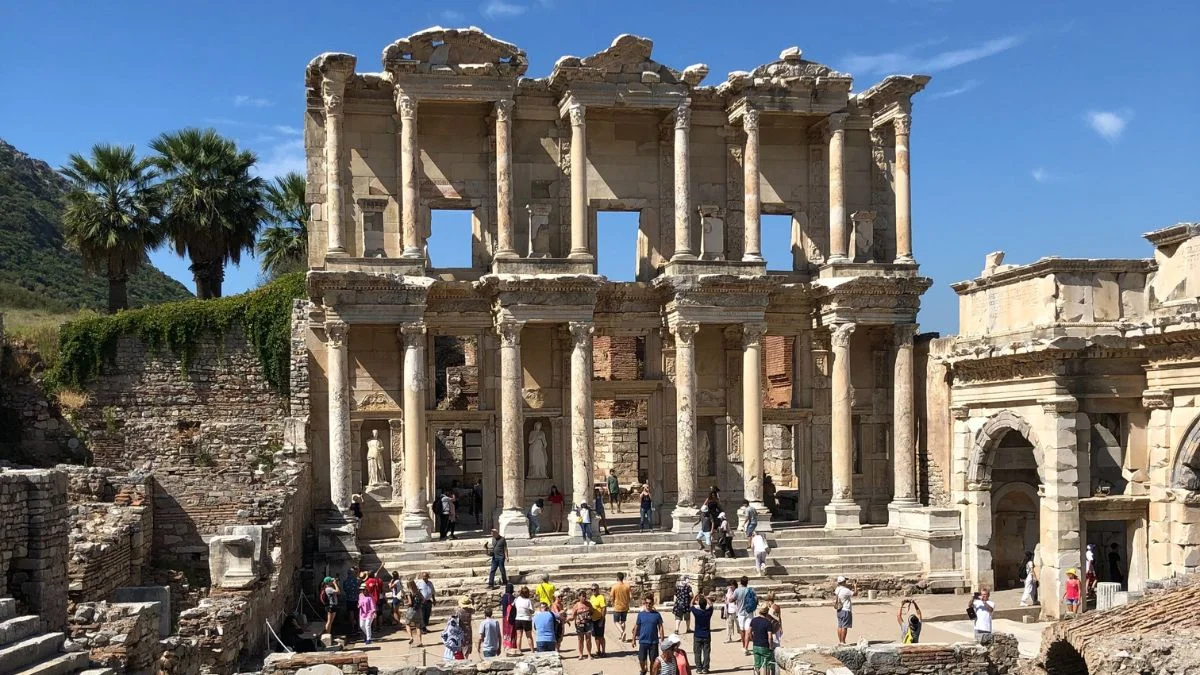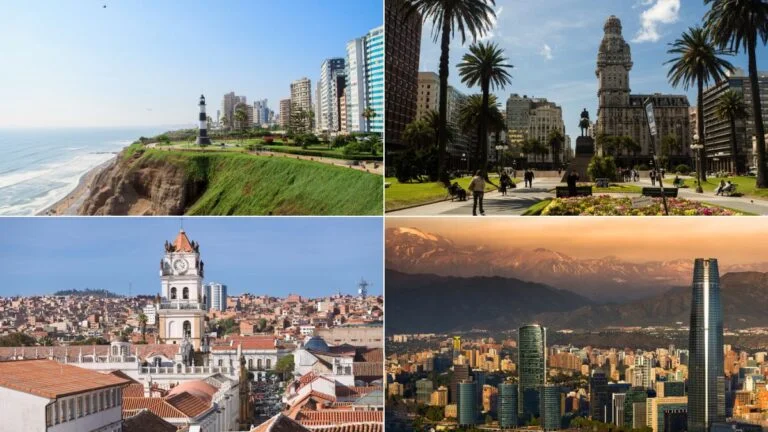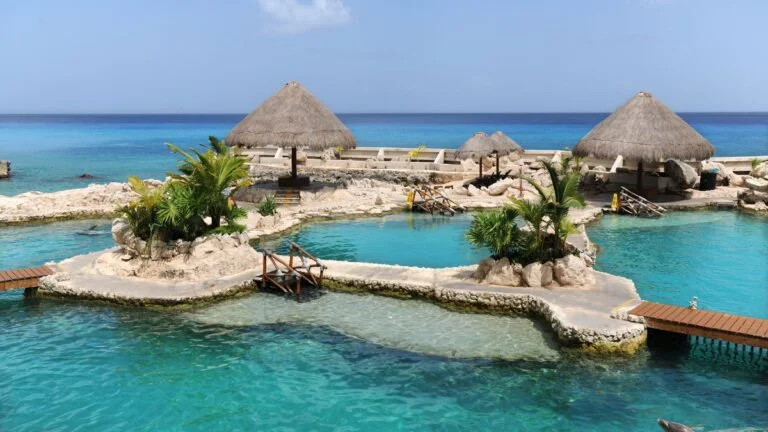50 Facts About Turkey You Need to Know Before Traveling There

As participants in Amazon Associates and other programs, we earn from qualifying purchases. This comes at no additional cost to you. For more details, see our Affiliate Disclosure.
Before embarking on your journey to Turkey, a land where continents collide, cultures intertwine, and history is alive at every corner, it’s essential to arm yourself with knowledge that goes beyond the usual travel guide. Turkey is a country rich in diversity, tradition, and stories, offering a tapestry of experiences that captivate the hearts of travelers. From its unique geographical position straddling Europe and Asia, to its ancient ruins whispering tales of civilizations past, and its culinary delights that are a feast for the senses, there’s much to discover. To help you navigate this fascinating country, here are 50 facts you need to know before traveling to Turkey, designed to enhance your visit and enrich your understanding of this vibrant nation.
1. The Only City in Two Continents
Istanbul stands as a unique metropolis straddling two continents, Europe and Asia, divided by the Bosporus Strait. This geographical rarity not only makes Istanbul a strategic crossroad but also a melting pot of cultures, cuisine, and architecture. The city’s rich history, from Byzantium to Constantinople to its current identity, reflects a blend of the East and the West, offering visitors an unparalleled experience of diversity and unity.
2. The Birthplace of Santa Claus
Far from the snowy landscapes of the North Pole, the story of Santa Claus begins in the ancient town of Patara, Turkey. Saint Nicholas, born here in the 4th century, was known for his generosity and kindness, particularly to children. His legend grew over centuries, eventually becoming the jolly figure of Christmas cheer celebrated worldwide.
3. Home to One of the Seven Wonders
The Temple of Artemis at Ephesus, one of the Ancient World’s Seven Wonders, showcases Turkey’s rich historical tapestry. Though little remains of this once magnificent structure, its legacy lives on, drawing visitors to marvel at its site and imagine its past grandeur, embodying the advanced architectural and cultural achievements of its time.
4. The World’s Largest Bazaar
The Grand Bazaar in Istanbul is not just a market; it’s a historical marvel and a sensory overload. As one of the world’s oldest and largest covered markets, it boasts over 4,000 shops spread across 60 streets. The bazaar is a labyrinth of treasures, from spices and sweets to jewelry and ceramics, offering a shopping experience steeped in history.
5. A Haven for Coffee Lovers
Turkish coffee is more than a morning beverage; it’s a cultural institution, recognized by UNESCO for its unique preparation and social importance. Brewed slowly in a cezve with water and finely ground coffee beans, then served in small cups, Turkish coffee’s rich history is matched by its robust flavor and the tradition of fortune telling through its grounds.
6. The Land of Four Seasons
Turkey’s diverse climate allows for a unique experience of four distinct seasons within its borders. From the snowy peaks of the Taurus Mountains to the warm, sandy beaches of the Aegean and Mediterranean coasts, each region offers its own seasonal charms, making Turkey a versatile destination year-round.
7. The Legendary Troy Exists Here
The ancient city of Troy, immortalized by Homer in the Iliad, was long considered a myth until its rediscovery in the late 19th century in modern-day Turkey. Visitors can explore the ruins of this legendary city, including the reconstructed Trojan Horse, and walk the grounds that witnessed one of history’s most famous battles.
8. The Origin of Tulips
While tulips are synonymous with the Netherlands, their origins lie in Turkey. The Ottoman Empire cultivated and popularized these beautiful flowers long before they became a craze in Europe. The tulip era in the 18th century marked a period of peace and prosperity, with the flower becoming a symbol of wealth and prestige.
9. A Country of UNESCO World Heritage Sites
Turkey is home to numerous UNESCO World Heritage Sites, highlighting its rich cultural and natural heritage. From the historical marvels of Istanbul and the rock formations of Cappadocia to the ancient cities of Ephesus and Göbekli Tepe, these sites offer a glimpse into human history and natural beauty, attracting scholars and tourists alike.
10. The Ancient Tradition of Oil Wrestling
Oil wrestling, or Yağlı Güreş, is Turkey’s national sport, with a history dating back to the Ottoman Empire. Wrestlers, or pehlivans, doused in olive oil, grapple to win the golden belt in the annual Kırkpınar tournament, a tradition that symbolizes strength, honor, and masculinity, deeply rooted in Turkish culture.
11. The World’s First Christian Church
The world’s first Christian church is believed to be located in Antioch, Turkey, a cave church known as St. Peter’s Grotto. This significant religious site marks the early adoption of Christianity and its spread through the Roman Empire, showcasing Turkey’s importance in the history of Christianity.
12. The Origin of Saint Nicholas
Saint Nicholas, known for his generosity and the basis for the modern-day Santa Claus, originated from Demre (ancient Myra) in Turkey. The 4th-century bishop’s acts of kindness, such as secretly giving gifts to those in need, laid the foundation for the Santa Claus legend, making Turkey part of a global Christmas tradition.
13. A Culinary Paradise
Turkish cuisine, with its diverse flavors and dishes, is a reflection of the country’s rich history and cultural exchanges. From savory kebabs and mezes to sweet baklava and Turkish delight, the cuisine is a blend of Central Asian, Middle Eastern, Eastern European, and Balkan cuisines, making Turkey a true paradise for food enthusiasts.
14. The Land of Cherries
Turkey is one of the world’s leading producers of cherries, and the fruit’s history can be traced back to the Anatolian region. The town of Giresun is credited with giving the cherry its name and introducing it to the Roman Empire, from where it spread across Europe, making Turkey essential in the cherry’s global journey.
15. Tea is More Popular Than Coffee
While Turkish coffee may be famous worldwide, tea is the beverage of choice within Turkey. Grown mainly in the Black Sea region, Turkish tea, served in a tulip-shaped glass, is a symbol of hospitality and companionship, consumed at any time of the day, reflecting the communal culture of the Turkish people.
16. Hosting the Bird Paradise
Turkey’s unique geographical location makes it a haven for birdwatchers, hosting a wide variety of bird species, especially in areas like Lake Van and the wetlands of the Kızılırmak Delta. These natural habitats serve as critical stopover points for migratory birds, making Turkey a significant country for avian biodiversity.
17. The Importance of the Evil Eye
The Nazar, or evil eye, is a protective amulet against bad luck and is deeply embedded in Turkish culture. This blue and white eye-shaped symbol is found everywhere in Turkey, from jewelry to home decor, reflecting the belief in the power of envy and the need for protection against it.
18. Unique Underground Cities
The underground cities of Cappadocia, such as Derinkuyu and Kaymaklı, are engineering marvels, offering a glimpse into ancient defensive strategies. These cities could shelter thousands from invaders, complete with homes, churches, and stables, carved from the soft volcanic rock, showcasing the ingenuity of past civilizations.
19. The Historical Significance of Anzac Cove
Anzac Cove, on the Gallipoli Peninsula, is a site of profound significance for Australians and New Zealanders, marking the landing of the ANZAC troops during World War I. The campaign’s failure and the ensuing loss of life have left a lasting legacy of camaraderie, bravery, and remembrance, commemorated annually on Anzac Day.
20. The Majestic Mount Ararat
Mount Ararat, Turkey’s highest peak, holds mythical status as the resting place of Noah’s Ark according to the Bible. This snow-capped dormant volcano near the Armenian border is not only a symbol of national pride but also a stunning natural landmark, attracting climbers and believers alike.
21. The Ancient City of Ephesus
Ephesus, one of the best-preserved ancient cities in the world, offers a window into Roman life. Highlights include the Library of Celsus and the Great Theatre. This archaeological site in western Turkey is a testament to the country’s historical importance as a major center of trade and culture in the ancient world.
22. The Iconic Blue Mosque
The Blue Mosque, or Sultanahmet Camii, in Istanbul, is renowned for its striking architecture and blue tilework adorning its interior. Built during the rule of Sultan Ahmet I, it uniquely serves as both a tourist attraction and a place of worship, symbolizing the city’s historical and cultural richness.
23. The Influence of the Silk Road
Turkey’s strategic position on the Silk Road significantly influenced its development, serving as a bridge between East and West. This ancient trade route facilitated the exchange of goods, ideas, and cultures, enriching the Ottoman Empire and shaping Turkey’s historical and cultural landscape.
24. The Whirling Dervishes Ceremony
The Sema ceremony, performed by the Whirling Dervishes, is a spiritual journey of the Mevlevi Order, founded by Rumi. This mesmerizing dance, characterized by spinning in white flowing robes, represents a mystical journey towards divine love, reflecting the rich Sufi culture embedded in Turkey.
25. The Legendary Pamukkale
Pamukkale, meaning “cotton castle” in Turkish, is famed for its terraces of mineral-rich thermal waters cascading down white travertine hills. This natural wonder, alongside the ancient city of Hierapolis, creates a breathtaking landscape that has been a therapeutic and spiritual site since antiquity.
26. The Grandeur of the Hagia Sophia
The Hagia Sophia, a masterpiece of Byzantine architecture in Istanbul, has served as a cathedral, mosque, and now a museum, reflecting the city’s diverse religious history. Its massive dome and stunning mosaics exemplify the artistic and architectural achievements of its time, making it a symbol of timeless beauty and resilience.
27. A Landscape from Another Planet: Cappadocia
Cappadocia is renowned for its surreal landscape, characterized by fairy chimneys, vast underground cities, and ancient cave churches. The region’s natural beauty and historical significance, best viewed from a hot air balloon at dawn, make it a must-visit destination for adventurers and historians alike.
28. The Gallipoli Peninsula’s History
The Gallipoli Peninsula is a site of national pride and remembrance in Turkey, known for the historic battle of WWI where Turkish forces, led by Mustafa Kemal Atatürk, successfully defended against Allied troops. This event not only shaped Turkey’s independence but also fostered a legacy of respect and commemoration between former foes.
29. The Spice Bazaar’s Aromas
Istanbul’s Spice Bazaar, or Egyptian Bazaar, is a feast for the senses, with stalls brimming with vibrant spices, dried fruits, nuts, and sweets. Established in the 17th century, it remains a crucial spot for culinary enthusiasts seeking to discover the flavors that define Turkish cuisine.
30. The Tradition of Turkish Baths
The hammam, or Turkish bath, is an integral part of Turkey’s cultural fabric, offering a unique blend of socialization, relaxation, and purification. Originating from Roman and Byzantine bath culture, these steam baths provide a deep, cleansing experience, highlighting the importance of wellness in Turkish culture.
31. The Beauty of the Bosphorus
The Bosphorus Strait not only divides Istanbul between two continents but also offers some of the city’s most picturesque views. A cruise on the Bosphorus provides a unique perspective on Istanbul’s skyline, showcasing historic palaces, fortresses, and bridges that narrate the city’s rich history.
32. Turkish Hospitality
Hospitality is a cornerstone of Turkish culture, deeply rooted in the country’s traditions and way of life. Visitors are often greeted with warm welcomes, generous meals, and a genuine interest in sharing cultural experiences, making every guest feel like part of the family.
33. The Ottoman Empire’s Legacy
The Ottoman Empire’s influence on Turkey is indelible, from magnificent architectural wonders to the fusion of cultures that characterizes modern Turkish society. The empire’s legacy is a tapestry of diversity, innovation, and tradition, evident in every aspect of Turkey’s cultural and historical landscape.
34. The Delightful Turkish Breakfast
A Turkish breakfast, or kahvaltı, is a feast that extends beyond a simple morning meal, featuring an array of cheeses, olives, bread, eggs, and more. This communal and leisurely meal reflects the importance of food and family in Turkish culture, offering a delicious start to the day.
35. The Power of Turkish Tea Gardens
Turkish tea gardens, or çay bahçesi, are more than just places to enjoy a cup of tea; they are social hubs where people gather to relax, chat, and enjoy the view. Located throughout Turkey, these gardens embody the communal spirit of Turkish society, offering a peaceful respite from daily life.
36. A Leader in Cherry Production
Turkey’s dominance in cherry production is not just an agricultural feat; it’s a reflection of the country’s rich agricultural heritage and favorable climate. Cherries from Turkey are sought after worldwide, underscoring the country’s role in global fruit production and its agricultural prowess.
37. The Mysterious City of Gobekli Tepe
Göbekli Tepe, the world’s oldest known temple, predates Stonehenge by thousands of years. This archaeological site challenges our understanding of early human society, offering a glimpse into prehistoric worship and social organization, and highlighting Turkey’s significance in the ancient world.
38. The Colorful Tradition of Turkish Carpets
Turkish carpets are renowned for their intricate designs, vibrant colors, and craftsmanship. These carpets are not just floor coverings but cultural artifacts, telling stories through their patterns and symbolizing the weaver’s identity, making them a cherished aspect of Turkish heritage.
39. The Vibrant Nightlife of Istanbul
Istanbul’s nightlife is a vibrant tapestry of experiences, from traditional taverns, or meyhanes, serving raki and meze, to cutting-edge clubs and bars. The city comes alive at night, offering entertainment and cultural experiences that reflect its modern, dynamic spirit.
40. The Sacred Site of Konya
Konya, the spiritual heartland of Turkey, is the final resting place of the Sufi mystic Rumi. Visitors come to explore its rich history, attend the Whirling Dervishes ceremony, and experience the profound spiritual legacy that continues to attract seekers of wisdom from around the world.
41. The Historical Galata Tower
Galata Tower, one of Istanbul’s most iconic landmarks, offers breathtaking panoramic views of the city. Dating back to the 14th century, this medieval stone tower has served various roles over the centuries, from observatory to prison, and now stands as a testament to Istanbul’s rich historical layers.
42. The Riches of the Topkapi Palace
Topkapi Palace, once the residence of Ottoman sultans, now serves as a museum showcasing the empire’s opulence. Its lavish courtyards, exquisite harem, and treasured artifacts, including the Prophet Muhammad’s cloak, offer a glimpse into the luxurious life of the Ottoman court.
43. The Charm of the Princes’ Islands
The Princes’ Islands, a group of nine car-free islands off Istanbul’s coast, provide a tranquil escape from the city’s hustle and bustle. With their historic mansions, pine forests, and horse-drawn carriages, these islands offer a glimpse of a bygone era, inviting visitors to slow down and enjoy their natural beauty.
44. The Ancient Theatre of Aspendos
The ancient theatre of Aspendos is one of the best-preserved examples of Roman theatre architecture in the world. Built in the 2nd century AD, it boasts exceptional acoustics and architecture, hosting performances that continue to entertain, bridging the past and present through the universal language of art.
45. The Bridge Between Cultures
Turkey’s unique position as a bridge between the East and the West has shaped its identity, fostering a rich tapestry of cultures, religions, and traditions. This cross-continental blend has made Turkey a meeting point of civilizations, where diverse influences coalesce into a vibrant cultural mosaic.
46. The Unique Flavors of Turkish Cuisine
Turkish cuisine is a culinary mosaic, influenced by various cultures and regions, offering an array of flavors from the spicy kebabs of the southeast to the seafood of the Aegean coast. Each dish tells a story of migration, conquest, and exchange, making Turkish food a delicious journey through history.
47. The First Temple of the World
Göbekli Tepe, dating back to the 10th millennium BC, is considered the world’s first temple. This prehistoric site, with its massive carved stones and mysterious motifs, challenges previous assumptions about the origins of civilization and religious structures, marking a significant discovery in human history.
48. The Warm Waters of the Mediterranean
The Turkish Mediterranean coast, with its clear blue waters, ancient ruins, and picturesque harbors, offers a perfect blend of relaxation, adventure, and history. From the Lycian Way with its scenic hiking trails to the sandy beaches of Antalya, the Mediterranean coast is a paradise for travelers.
49. The National Sport: Oil Wrestling
Oil wrestling is an ancient sport that embodies the spirit of Turkish culture, emphasizing strength, honor, and tradition. The annual Kırkpınar tournament, held in Edirne, is the oldest continuously running, sanctioned sporting competition in the world, dating back over 650 years.
50. The Turkish Love for Street Food
Turkish street food is an essential part of the country’s culinary culture, offering a variety of flavors that cater to every palate. From the iconic simit and balık ekmek to the savory döner and sweet morsels of lokma, Turkish street food provides a taste of the country’s rich flavors and traditions at every corner.






